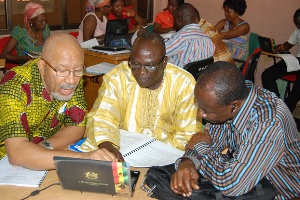 A workshop in Kumasi to update principals in ICT
A workshop in Kumasi to update principals in ICT
One of the key questions fit for the purpose of education in this age was launched in no better place than in the Ghana Education Service (GES) syllabus. Serving as a preamble, the syllabus charged teachers to consider the reasons “Why some nations are rich and others poor!”
I stand ever ready to give a monumental hug to whoever had the visionary mind to put that gem in the syllabus. In training teachers in Ghana, that query happened to be my very first port of call, knowing darn well that the cognitive abilities of human beings are the same across the continents. It’s all about how each nation chooses to organize their affairs and manage their time, considering that all countries have 24 hours in a day.
Today’s column is the final instalment of Moses Baiden’s classic keynote address at the Ghana CEO Summit 2017, Kempinski Hotel, Accra, 22nd – 23rd May, 2017. Many thanks to readers for the positive responses so far. Baiden’s address follows:
The four industrial revolutions
The 1st industrial revolution in the late 18th and early 19th century saw the shift from a rural agricultural economy to an industrial one. It was the advent of textile, iron, coal and the steam engine. The world economy expanded exponentially and dramatically.
The 2nd industrial revolution took off late in the 19th century and continued into the 20th century: Alexander Graham Bell’s telephone, Thomas Edison’s light bulb and phonography, Thomas Newcomen’s steam engine, the Wright brothers’ plane, and many other inventions created brand new industries.
In these 1st and 2nd industrial revolutions, spanning over 300 years, Africa and Ghana did not participate meaningfully. First, we were busy fighting amongst ourselves, and later selling off our enemies, and sometimes our friends, into slavery for short term profit. The most visible negatives were the inferiority complex and a stigma with our colour that persists up to today!
The 3rd industrial revolution departed from the mechanical, electric and analogue systems, devices, and products; it ushered in the computer age. From the 1980s, this age saw the emergence of personal computers and then the internet, which created the Information, Communication and Technology (ICT) age.
This 4th industrial revolution – the Age of Digitisation – is the mother of all revolutions and will alter the world fundamentally and dramatically. As a country and as businesses we need to carve out a sound vision and be deliberately involved in a major way.
The digital revolution in Ghana
Let me use a familiar cliché – Government has to ‘create the enabling environment’ so that digital companies can be created right here in Africa, in Ghana. Mr. President, the CEOs of this country – and I think I speak for all of us – would like you to declare a new age of enlightenment defined by vision, passion, values, patriotism and the national interest to create an ethical, meritocratic, transparent, professional, digital, open and performance driven environment in Ghana.
This environment must promote the capable, the knowledgeable, the passionate, the hardworking and the diligent; the pursuit of efficiency and productivity will attract the brightest and the best to Ghana and keep them in Ghana to give birth to the great digital entrepreneurs. We have to expand our economy and move it to the first world. Policy, law and education are needed to create the digitised environment and cultivate the minds of our children and adolescents with the right content, discipline and orientation for the 4th Industrial revolution: the digital revolution.
Politre-preneurs and Tender-preneurs
One of the most significant statements that you have made is that your government is open for business and to promote the private sector. Your proclamation that public service is public service – and people wanting to make money should join the private sector and not your government – is new, fresh and significant indeed. An economy that is based on “politre-preneurs” and “tender-preneurs” will not create any lasting value and will in the end leave a legacy of poverty for our children. Digitally constrained economies are deficient, largely because they have yet to establish an ICT ecosystem that can capitalize on the benefits of digitization.
Alas! Ghana is classified as a digitally constrained economy, but we can change this to become a world leader in 10 years. The government must strive to provide this environment or we risk missing the digital revolution. Let us not create a Ghana in which any initiative that is not pre-authorised by the government in power never sees the light of day. If we do, Ghanaian entrepreneurs will simply stop trying. For those that tried, it has been 60 years of – in the words of Etienne Balazs – “endless paperwork and endless harassment”.
Public Private Dialogue
Critical for this digitised economy is a regular collaboration between business and government. The lack of a serious Public Private Dialogue over the past 60 years – to shape and deliver the economic transformation vision for the country – has been an unacceptable omission. Mr. President, your presence here gives us hope and affirms the seriousness that you attach to the role of the private sector and the importance of a public private dialogue to advance our country in creating wealth, expanding our economy and lifting millions out of misery.